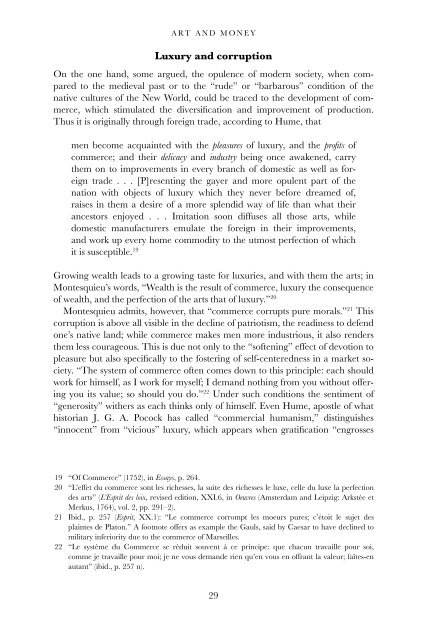Art in its Time: Theories and Practices of Modern Aesthetics
Art in its Time: Theories and Practices of Modern Aesthetics
Art in its Time: Theories and Practices of Modern Aesthetics
You also want an ePaper? Increase the reach of your titles
YUMPU automatically turns print PDFs into web optimized ePapers that Google loves.
ART AND MONEY<br />
Luxury <strong>and</strong> corruption<br />
On the one h<strong>and</strong>, some argued, the opulence <strong>of</strong> modern society, when compared<br />
to the medieval past or to the “rude” or “barbarous” condition <strong>of</strong> the<br />
native cultures <strong>of</strong> the New World, could be traced to the development <strong>of</strong> commerce,<br />
which stimulated the diversification <strong>and</strong> improvement <strong>of</strong> production.<br />
Thus it is orig<strong>in</strong>ally through foreign trade, accord<strong>in</strong>g to Hume, that<br />
men become acqua<strong>in</strong>ted with the pleasures <strong>of</strong> luxury, <strong>and</strong> the pr<strong>of</strong><strong>its</strong> <strong>of</strong><br />
commerce; <strong>and</strong> their delicacy <strong>and</strong> <strong>in</strong>dustry be<strong>in</strong>g once awakened, carry<br />
them on to improvements <strong>in</strong> every branch <strong>of</strong> domestic as well as foreign<br />
trade . . . [P]resent<strong>in</strong>g the gayer <strong>and</strong> more opulent part <strong>of</strong> the<br />
nation with objects <strong>of</strong> luxury which they never before dreamed <strong>of</strong>,<br />
raises <strong>in</strong> them a desire <strong>of</strong> a more splendid way <strong>of</strong> life than what their<br />
ancestors enjoyed . . . Imitation soon diffuses all those arts, while<br />
domestic manufacturers emulate the foreign <strong>in</strong> their improvements,<br />
<strong>and</strong> work up every home commodity to the utmost perfection <strong>of</strong> which<br />
it is susceptible. 19<br />
Grow<strong>in</strong>g wealth leads to a grow<strong>in</strong>g taste for luxuries, <strong>and</strong> with them the arts; <strong>in</strong><br />
Montesquieu’s words, “Wealth is the result <strong>of</strong> commerce, luxury the consequence<br />
<strong>of</strong> wealth, <strong>and</strong> the perfection <strong>of</strong> the arts that <strong>of</strong> luxury.” 20<br />
Montesquieu adm<strong>its</strong>, however, that “commerce corrupts pure morals.” 21 This<br />
corruption is above all visible <strong>in</strong> the decl<strong>in</strong>e <strong>of</strong> patriotism, the read<strong>in</strong>ess to defend<br />
one’s native l<strong>and</strong>; while commerce makes men more <strong>in</strong>dustrious, it also renders<br />
them less courageous. This is due not only to the “s<strong>of</strong>ten<strong>in</strong>g” effect <strong>of</strong> devotion to<br />
pleasure but also specifically to the foster<strong>in</strong>g <strong>of</strong> self-centeredness <strong>in</strong> a market society.<br />
“The system <strong>of</strong> commerce <strong>of</strong>ten comes down to this pr<strong>in</strong>ciple: each should<br />
work for himself, as I work for myself; I dem<strong>and</strong> noth<strong>in</strong>g from you without <strong>of</strong>fer<strong>in</strong>g<br />
you <strong>its</strong> value; so should you do.” 22 Under such conditions the sentiment <strong>of</strong><br />
“generosity” withers as each th<strong>in</strong>ks only <strong>of</strong> himself. Even Hume, apostle <strong>of</strong> what<br />
historian J. G. A. Pocock has called “commercial humanism,” dist<strong>in</strong>guishes<br />
“<strong>in</strong>nocent” from “vicious” luxury, which appears when gratification “engrosses<br />
19 “Of Commerce” (1752), <strong>in</strong> Essays, p. 264.<br />
20 “L’effet du commerce sont les richesses, la suite des richesses le luxe, celle du luxe la perfection<br />
des arts” (L’Esprit des loix, revised edition, XXI.6, <strong>in</strong> Oeuvres (Amsterdam <strong>and</strong> Leipzig: Arkstée et<br />
Merkus, 1764), vol. 2, pp. 291–2).<br />
21 Ibid., p. 257 (Esprit, XX.1): “Le commerce corrompt les moeurs pures; c’étoit le sujet des<br />
pla<strong>in</strong>tes de Platon.” A footnote <strong>of</strong>fers as example the Gauls, said by Caesar to have decl<strong>in</strong>ed to<br />
military <strong>in</strong>feriority due to the commerce <strong>of</strong> Marseilles.<br />
22 “Le système du Commerce se réduit souvent à ce pr<strong>in</strong>cipe: que chacun travaille pour soi,<br />
comme je travaille pour moi; je ne vous dem<strong>and</strong>e rien qu’en vous en <strong>of</strong>frant la valeur; faîtes-en<br />
autant” (ibid., p. 257 n).<br />
29
















